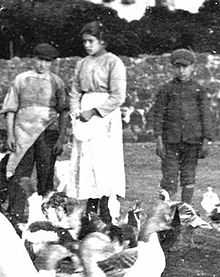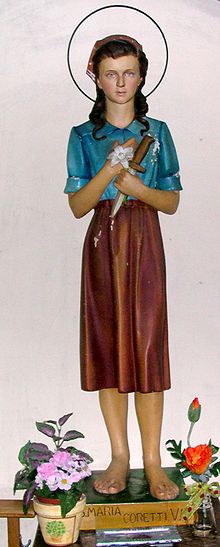Saint Maria Goretti and Barbie
 |
| Maria 1901 |
Saint Maria Goretti (October 16, 1890 – July 6, 1902) is an Italian virgin-martyr of the Catholic Church, and one of the youngest canonized saints. She was born to a farming family. Her father died when she was nine, and they had to share a house with another family, the Serenellis. Maria took over household duties while her mother, brothers, and sister worked in the fields.
On July 5, 1902, eleven-year-old Maria was sitting on the outside steps of her home, sewing and watching the baby sleep, while Alessandro Seenelli was threshing beans in the barnyard. Knowing she would be alone, he returned to the house and threatened to stab if she did not do what he said; he was intending to rape her. She would not submit, however, protesting that what he wanted to do was a sin and warning him that he would go to Hell. She fought desperately and kept screaming, "No! It is a sin! God does not want it!" He first choked her, but when she insisted she would rather die than submit to him, he stabbed her eleven times. She tried to reach the door, but he stopped her by stabbing her three more times before running away.
The baby awoke with the noise and started crying, and when the mother came to check on her, they found Maria on the floor bleeding and took her to the nearest hospital in Nettuno. She underwent surgery but her injuries were beyond the doctors' help and she died.
Alessandro Serenelli was captured shortly after the attack: the police taking him to prison overtook the ambulance carrying Maria to the hospital. Originally, he was going to be sentenced to life, but since he was a minor at that time it was commuted to 30 years; judges even considered he was not as mature as he was expected to be and that he grew up in a poor, neglectful family, with several brothers and relatives suffering from madness and an alcoholic father. It has also been suggested that it was due to her mother's plea for mercy that he was not sentenced to death. He insisted he had attempted to rape her several times and decided to kill her because of her refusal and desperate crying. He remained unrepentant and uncommunicative from the world for three years, until a local bishop, Monsignor Giovanni Blandini,visited him in jail. He wrote a thank you note to the Bishop asking for his prayers and telling him about a dream, "in which Maria gave him lilies, which burned immediately in his hands. Alessandro had a religious conversion and became a changed man.
 |
| La Cascina Antica, the Goretti home is on the right. |
After his release, Alessandro visited Assunta, Maria’s mother, and begged her forgiveness. She forgave him, saying that Maria said to forgive him on her death bed so she could not do less.
Rumors of miracles happening abounded at this time when people prayed for Maria’s intercession. Maria's three brothers would claim that she intervened miraculously in their lives. Angelo heard her voice telling him to emigrate to America. Maria’s brother Alessandro was reportedly miraculously given a sum of money to finance his own emigration to join Angelo. Sandrino died in the United States in 1917, and Angelo died in Italy when he returned there in 1964. Mariano said he heard her voice telling him to stay in his trench when the rest of his unit charged the Germans in World War I. He, the only survivor of that charge, lived until 1975 and had a large family.
On June 24, 1950, Pius XII canonized Maria as a saint. Her mother Assunta was present at the ceremony, along with her four remaining sons and daughters, Maria’s siblings. Alessandro, her converted murderer was also present.
The story of Maria Goretti is a prelude to my essay, today. You needed to understand the background reference.
A few years ago, I was talking to an Italian missionary priest. He told me that he was born and grew up in the same village as Saint Maria Goretti. In fact, he and the other village children would often go to the Goretti house to visit Maria’s mother, Assunta Goretti. Assunta told the children stories.
I thought and said, Well, there you go. “ You grew up listening to stories told by a saint’s mother and you grew up to be a priest. I grew up playing with dolls and became a mother.”
Today I was wondering the role playing has in forming children’s career choices. I didn’t have many dolls but I had a few and they were all baby dolls. I played being a mommy.
Barbies weren’t around when I was playing. I was about 13 or 14 when I first heard of Barbie and I was too old to play with them. My daughters, on the other hand, had too many Barbies to count. They had just a couple of dolls that were babies. My daughters are grown now and one has children and one chooses to not have children. In fact, she looks like Barbie, i.e., long hair, large breasts, small waist, long legs and wears spikey heals. Mmmmm, do I see a pattern?
My granddaughters have no baby dolls, lots of Barbies, American Girl dolls, and Doc McStuffins. And I currently read that couples today aren’t having children. Is it because they never played mommy? They would rather have a pink corvette like Barbie and keep their Barbie-like figure.
 |
| Statue of Maria holding lilies and a knife |
What do you think?



No comments:
Post a Comment